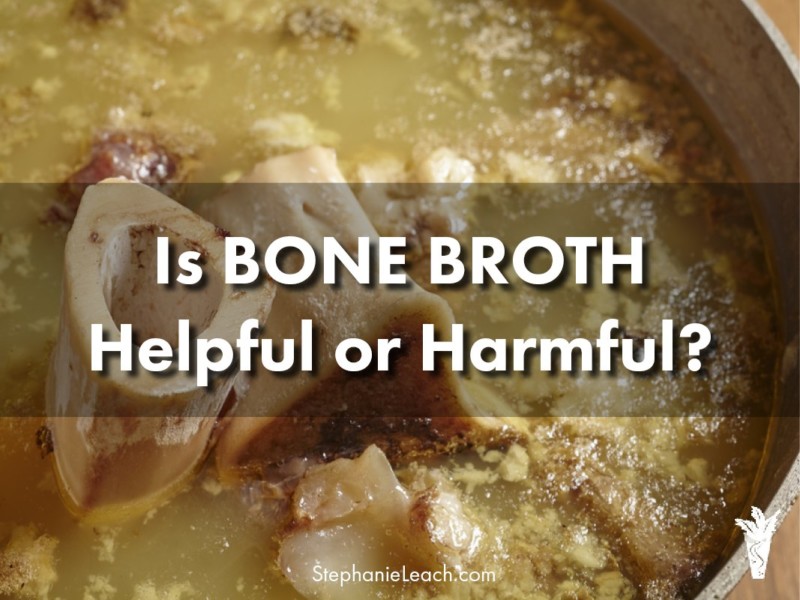Bone broth, stock made from animal bones, is touted by many as health promoting. You see cartons of it in the grocery stores (this “miracle” broth is even available on the pet food aisle.)
Well known individuals like Dr. Axe promote and sell a bone broth protein powder and bone broth protein bars, and a growing number of nutritionists and wellness professionals recommend it to their clients.
BetterNutrition.com claims, “Not only is bone broth a comforting beverage or soup, it’s also nutritious and healing, aiding digestion, joint function, immunity, skin, and virtually every other function in the body. Is there more to know?”
Yes. There is definitely more to know – the facts.
Whether you have adopted a whole food, plant-based diet, or are just trying to increase the amount fruits and veggies in your diet, you may be wondering if there are some health benefits you are missing out on if you don’t drink bone broth.
I’ll get straight to the answer. In the words of Dr. Pam Popper in her YouTube video, “bone broth can’t possibly help you.”
Here’s why . . .
Collagen and Cartilage in Bone Broth
Dr. Popper is a big proponent of helping people understand how their bodies work, so that we can better sort out fact from diet fiction.
Since bone broth contains collagen and cartilage derived from animal bones, proponents of bone broth suggest that this may help us rebuild cartilage and improve our own skin, joint and bone health.
“The idea that because bone broth or stock contains collagen it somehow translates to collagen in the human body is nonsensical.” – T. Colin Campbell, Center for Nutrition Studies.
Swallowing cartilage and collagen does not translate to cartilage and collagen in your body. When we consume collagen and cartilage it is broken down just like every other protein into individual amino acids and minerals. Your body can then use them to create hormones, tissues and whatever else is needed.
There is no advantage to consuming amino acids and minerals from bone broth versus vegetable broth or other plant foods. Your body breaks them down the same.
Studies on Bone Broth
The oldest relevant study was published in 1934. This study compared bone broth to bone and vegetable broth. It concluded that bone broth was a poor source of many nutrients, but the addition of vegetables produced a broth with potassium, calcium, magnesium and iron.
A more recent study published in 2017 noted that both homemade and commercial bone broths were a poor source of calcium and magnesium.
“Eating a diet rich in leafy green vegetables is ideal. Plants offer richer sources in collagen building blocks and, in addition, provide nutrients not found in sufficient quantities in meats or broth.” – Dr. Kantha Shelke, food scientist and spokesperson for the Institute of Food Technologists.
What About Chicken Soup?
Before I learned about the many benefits of plant-based nutrition, I used to save my roasted chicken carcass, and make a long slow chicken broth for soup. I thought this was very nourishing, especially good for fighting colds.
But what do the studies actually show?
A chicken soup study published in 2000 (and widely circulated,) found that chicken soup was beneficial for people that were sick with a cold, since they noted a mild reduction in inflammation and reduced respiratory infection symptoms in study subjects.
But what were they eating? Not bone broth. They were eating a chicken soup that contained a lot of vegetables! There was celery, parsley and lots of root vegetables, including onions, sweet potatoes, parsnip, turnip and carrots.
Heavy Metals In Your Bone Broth?
Not only does bone broth not have anything special to offer, it may contain substances that are actually harmful.
A study published in 2013 raised the alarm on bone broth. Since it is known that heavy metal lead is sequestered in the bones, they wondered if it would show up in bone broth.
The tested 3 different broths made from organic, free-range chicken. Broth #1 used chicken bones. Broth #2 used chicken meat without bones, and broth #3 used chicken skin and cartilage from chicken without the bones.
All 3 chicken broths exceeded the maximum allowable levels of lead.
How bad is lead? Lead is toxic to the nerves, gastrointestinal tract, bone marrow and kidneys. Lead negatively affects every single system in the body, and can result in peripheral neuropathy, irreversible neurological deficit, impaired cognition, anemia, abdominal pain, hypertension, and decreased fertility in both men and women.
There is no “safe” lead limit.
What Broth is Best?
If you want to boost your immunity with a warm, nourishing bowl of broth, ditch the bone broth and instead reach for mushroom soup. Mushrooms are proven to boost your immunity.
If you want to fight inflammation, a plant-based diet is the way to go. Animal protein causes inflammation. It elevates blood levels of C-reactive protein, an inflammation marker.
If you want healthy bones, skin and teeth, a healthy gut and clear skin, eat a large variety of vegetables and other plant foods. A delicious bowl of soup made with onions, garlic and root vegetables will deliver more nutrients for excellent health than bone broth, without the heavy metals, toxins and inflammation.
As a Certified Health Coach eager to help my clients, I learned early on that you cannot trust every dietary recommendation from “experts” or all individuals with an MD after their name. Always check the facts, and make dietary decisions based on the totality of the available research. Evidenced-based nutrition is where it’s at.









Leave A Comment